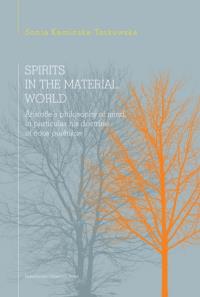
Spirits in the material world. Aristotle's philosophy of mind, in particular his doctrine of nous poêtikos
Aristotle's philosophy of mind, in particular his doctrine of nous poêtikos
-
Autor: Sonia Kamińska-Tarkowska
- ISBN: 978-83-233-5057-6
- EAN: 9788323350576
- Oprawa: Miękka
- Wydawca: Wydawnictwo Uniwersytetu Jagiellońskiego
- Format: 242x165x16mm
- Język: angielski
- Liczba stron: 214
- Rok wydania: 2022
- Wysyłamy w ciągu: 48h
-
Brak ocen
-
33,68złCena detaliczna: 46,20 złNajniższa cena z ostatnich 30 dni: 33,58 zł
x
This book is inspired by the quest for the proper function of Aristotle's active intellect presented in De Anima 3.5. The urge to grasp its essence has always driven philosophy ahead. Nevertheless, the true nature of nous poitikos remains far from being grasped. I will not unravel it here either, I am afraid. My aim is far more modest: to get through the existing interpretations and try to systematise them somehow. To speak in a more poetic, metaphorical way: my aim is to shed some light upon the subject. I wish to explore the light metaphor from De Anima 3.5 on many levels. To avoid getting lost in Aristotle and Aristotelian interpretations, I have divided the readings of nous poitikos into mystical and rational ones.
The third book of Aristotle's De Anima was and still is one of the most discussed fragments of ancient works. For centuries Western, Eastern and Arab philosophers have been engaged in disputes concerning the active intellect. Therefore, one should appreciate the Author's courage and the fact that she has decided to face the vast literature, got to know it, investigated it, and organized it. And this is, without doubt, the greatest value of her work. Most of the Aristotelian scholars perceive De Anima through the lens of earlier assumptions and presuppositions. Sonia Kamińska-Tarkowska tries to maintain methodological distance. Although she has her favourite' authors, she is critical towards them see, for instance, her discussion with Franz Brentano, an exquisite philosopher, and a specialist on Aristotle.' From the review by dr hab. Kazimierz Mrówka, prof. UP
Sonia Kamińska-Tarkowska, PhD, philosopher and translator currently working at the Institute of Philosophy at the Jagiellonian University. Her areas of expertise and interest are Aristotle's nous poitikos, Franz Brentano's Aristotle (Brentotle) and Franz Kafka's Metamorphosis .
The third book of Aristotle's De Anima was and still is one of the most discussed fragments of ancient works. For centuries Western, Eastern and Arab philosophers have been engaged in disputes concerning the active intellect. Therefore, one should appreciate the Author's courage and the fact that she has decided to face the vast literature, got to know it, investigated it, and organized it. And this is, without doubt, the greatest value of her work. Most of the Aristotelian scholars perceive De Anima through the lens of earlier assumptions and presuppositions. Sonia Kamińska-Tarkowska tries to maintain methodological distance. Although she has her favourite' authors, she is critical towards them see, for instance, her discussion with Franz Brentano, an exquisite philosopher, and a specialist on Aristotle.' From the review by dr hab. Kazimierz Mrówka, prof. UP
Sonia Kamińska-Tarkowska, PhD, philosopher and translator currently working at the Institute of Philosophy at the Jagiellonian University. Her areas of expertise and interest are Aristotle's nous poitikos, Franz Brentano's Aristotle (Brentotle) and Franz Kafka's Metamorphosis .

